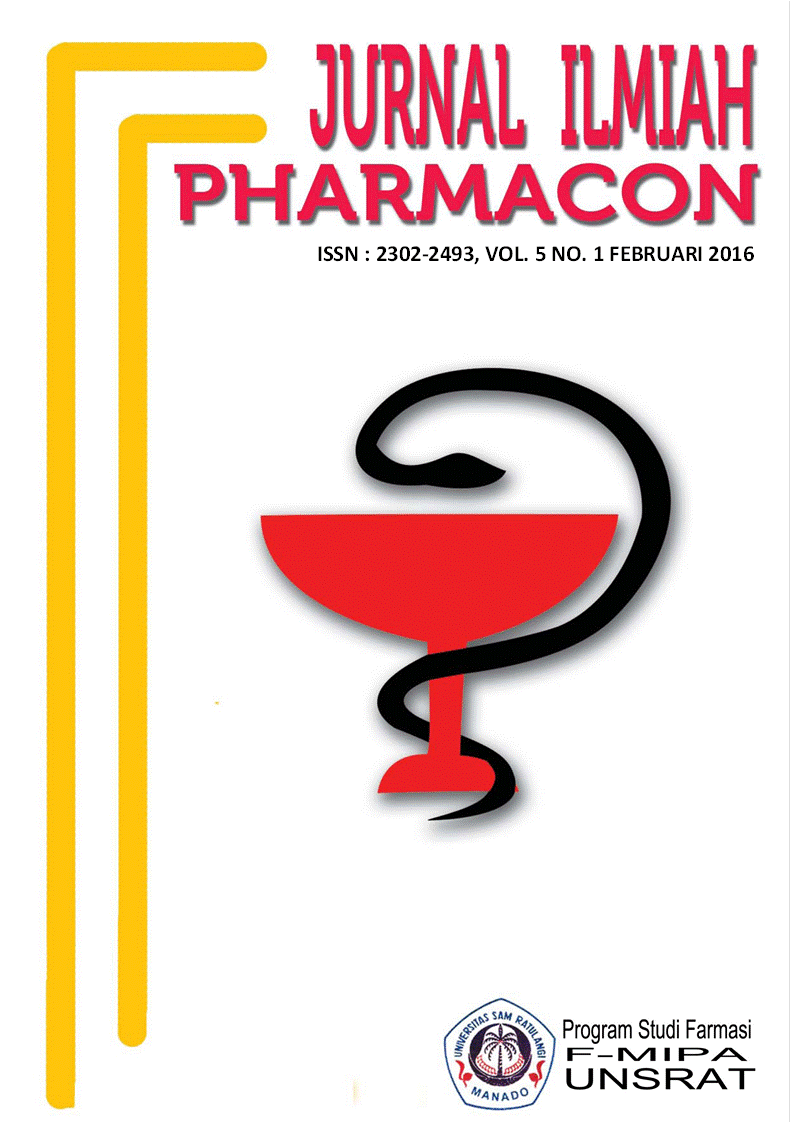HUBUNGAN STATUS EKONOMI DENGAN SIKAP PASIEN TERHADAP PERAWATAN GIGI TIRUAN
DOI:
https://doi.org/10.35799/pha.5.2016.11225Abstract
HUBUNGAN STATUS EKONOMI DENGAN SIKAP PASIEN TERHADAP PERAWATAN GIGI TIRUAN
Timothy Tuerah1), Vonny N.S Wowor1), Damajanty H.C Pangemanan1)
1)Prodi Studi Pendidikan Dokter Gigi, Fakultas Kedokteran, UNSRAT
Â
Â
ABSTRACT
The economic growth condition of North Sulawesi that slowing down can effect to the economic status of the people. Low level income wil increase the riskof tooth loss, so the need of denture care are also increase. One’s decision in determining teh need of denture care are infuenced by their knowledge and attitude toward the denture care. The purpose of this study is to describe the relationship between economic status and patient’s attitude toward denture care. This research was a adescriptive analytic reasearch with cross sectional study. The population in this research was the patients after tooth extraction at Rumah Sakit Gigi dan Mulut PSPDG-FK UNSRAT a total of 76 people, with the amount of sample of 44 people, using purposive sampling method. The research instruments are using a questionnaire. The result showed that the economic status of teeth extraction respondents was classified in poor category with the percentage of 70,5%, while the respondents attitude toward denture care was classified in positive category with the percentage of 81,8%. The result of statistical test obtained by p>0,05; therefore the H0 were accpted. The conclusion showed that in general the economic status of patients was classified in poor category, the patient’s attitude toward denture care was classified in positive category, and there’s no significant relations between the economic status with the patient’s attitude toward denture care.
Key words: economic status, patient’s attitude, denture care
Â
ABSTRAK
Kondisi pertumbuhan ekonomi Sulawesi utara yang menurun dapat memengaruhi status ekonomi masyarakat. Tingkat pendapatan yang rendah akan meningkatkan resiko kehilangan gigi individu, sehingga kebutuhan akan perawatan gigi tiruan juga meningkat. Keputusan individu untuk memperoleh perawatan gigi tiruan dipengaruhi oleh pengetahuan dan sikap mereka terhadap perawatan gigi tiruan. Tujuan penelitian ini adalah untuk mengetahui hubungan status ekonomi dan sikap pasien terhadap perawatan gigi tiruan. Penelitian ini merupakan penelitian deskriptif analitik dengan pencekatan cross sectional study. Populasi dalam peneltian ini yaitu pasien yang telah selesai melakukan pencabutan gigi di Rumah Sakit Gigi dan Mulut PSPDG-FK UNSRAT berjumlah 76 orang. Jumlah sampel penelitian sebesar 44 orang, diambil menggunakan purposive sampling method. Instrumen penelitian menggunakan kuesioner. Hasil penelitian menunjukkan bahwa status ekonomi responden tergolong miskin dengan persentase sebesar 70,5%, sedangkan sikap responden terhadap perawatan gigi tiruan tergolong positif dengan persentase sebesar 81,8%. Hasil uji statistik diperoleh nilai p>0,05; dengan demikian H0 diterima. Kesimpulan menunjukkan bahwa umumnya status ekonomi pasien tergolong miskin, sikap pasien terhadap perawatan gigi tiruan rata-rata tergolong positif, serta tidak terdapat hubungan yang signifikan antara status ekonomi dengan sikap pasien terhadap perawatan gigi tiruan.
Â
Kata kunci: status ekonomi, sikap pasien, perawatan gigi tiruan
Â
Downloads
Published
How to Cite
Issue
Section
License
Authors who publish with this journal agree to the following terms:
- Authors retain copyright and grant the journal right of first publication with the work simultaneously licensed under a Creative Commons Attribution-NonCommercial 4.0 International License that allows others to share the work with an acknowledgement of the work's authorship and initial publication in this journal.
- Authors are permitted and encouraged to post their work online (e.g., in institutional repositories or on their website) prior to and during the submission process, as it can lead to productive exchanges, as well as earlier and greater citation of published work (See The Effect of Open Access)










